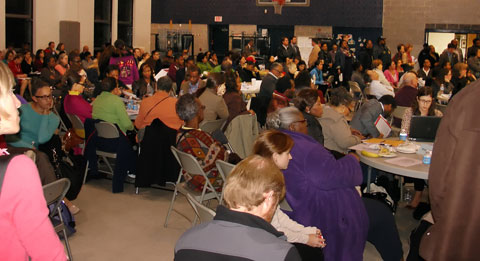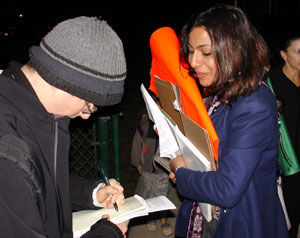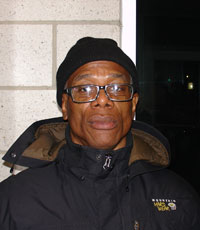Washington DC parents and teachers express outrage over schools plan
By Ed Hightower and Nick Barrickman
8 December 2012
 The meeting at Frances Stevens Elementary School
The meeting at Frances Stevens Elementary SchoolOn Wednesday, the Washington, District of Columbia Public Schools (DCPS) held the last in a series of public meetings designed to quell opposition to its plan to close 20 schools. In the fourth and final meeting, held in Ward 4 in Northwest D.C., the fraudulent character of the proceedings began to burst asunder.
DCPS chancellor Kaya Henderson has already decided on the “consolidation” of the district and the shuttering of 20 neighborhood schools. As was the case in similar public meetings held last week, the fact that the plan is a forgone conclusion was lost on no one. (See “Behind the growth of D.C. charter schools”)
Well before the meeting officially started, parents and teachers packed the large cafeteria at Frances Stevens Elementary in Ward 3. DCPS officials, politicians, reporters and union representatives also came out in such large numbers, as if they intended to drown parents and teachers in a giant bureaucratic morass. Even so, opposition seethed from the outset.
One young man, who later identified himself to the WSWS as a teacher, interrupted the initial comments of chancellor Henderson, decrying the sham character of the meeting and urging those present to oppose the consolidation plan as an attack on the right to public education. He received such overwhelming applause that the chancellor herself had to feign genuine concern for his point of view. Police quickly removed the man.
Visibly shaken by the outcry of public opposition, Henderson began to fumble with her prepared remarks, at one point letting slip that she didn't wish to hear “500 people saying ‘don’t close our schools.’” She would rather see parents bring her “500 enrollment applications.”
At small table discussions overseen by DCPS “facilitators,” parents and teachers repeatedly expressed anger that the school closures were in fact a fait accompli, and that the public meetings only served to provide a thin veneer of public support.
One parent asked a facilitator “What more do you want from us that you haven’t already decided?” Another implored, “Is this a proposal or a decision? Isn’t this meeting about appeasing us?”
The table discussion format, designed to stifle dissent, could not contain public anger. Parents and teachers demonstrated remarkable familiarity with the supposed rationales for closing various schools, as well as great vehemence in refuting them. One woman stated that Francis Stevens Elementary had been slated for closure in part because it had so many “out-of-border” students, meaning that those students had opted into a lottery to allow them to travel substantial distances to attend a school that was better than the equivalent in their own neighborhood. She rejected this reasoning, stating that the school was convenient for parents who worked nearby. An early childhood instructor seconded this sentiment, adding that as a result of the diversity of neighborhoods sending students to the school, the children in her class learned respect for those from different backgrounds.
 Interviewing an attendee outside the meeting
Interviewing an attendee outside the meetingLocal vice president of the National Federation of the Blind spoke to WSWS reporters about his concern for blind students at Frances Stevens. “The children at Frances Stevens have done a terrific job in accepting the students there at the program for the blind. They have embraced and encouraged them. The program is a great success in teaching these kids to accept those who are different. I don’t want to see the kids at the program taken out of Frances Stevens and sent to a school with poor facilities and a whole new group of children. But that is where things are headed.”
Hostility to DCPS permeated the table discussions. One teacher, who wished to remain anonymous, criticized the bloated DCPS bureaucracy. The facilitator at the table, a DCPS employee, loudly and angrily demanded to know, “So what is your plan… what are you proposing exactly?” The unfazed educator responded, “I do the jobs of three people all by myself. Why don’t you all try to do the work of three people?”
As with previous meetings, dozens lined up at a microphone to make comments after the table discussions. Many of those who spoke decried the DCPS bureaucracy as top-heavy, and criticized the fact that its top officials made so much more money than the teachers in the school system. A moderator interrupted one parent after the other who expressed outrage at DCPS and the consolidation plan, asking that they yield their time at the microphone so that others could be heard.
 William
WilliamA WSWS reporting team intervened, interviewing parents and teachers while distributing copies of the statement, “Mobilize the working class to defend D.C. public schools!”
William, a graduate of the D.C. school system, was disgusted with the consolidation plan and the meeting. He discussed the social right to an education with WSWS reporters and purchased a copy of the SEP’s program. He said, “I am glad that socialists are here at this meeting. We need to run all of these elected officials out of town and start running things for the benefit of the working class.”





Follow the WSWS